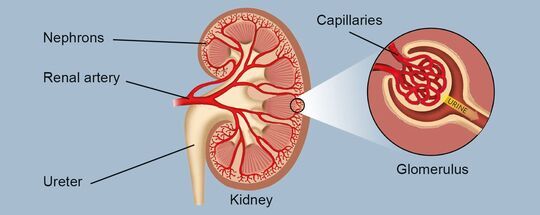Kidneys are bean-shaped organs, about the size of fists, located on either side of your spine near the middle of your back. These amazing organs help keep you healthy in so many ways—which is why kidney function is so crucial to your overall well-being.
Did you know? Most people are born with 2 kidneys, but you only need 1 to live a healthy life.
Your kidneys remove excess body water and waste products 24 hours a day. The excess body water and waste products are removed from your body as urine. However, kidneys don’t just clean your blood, they also play other vital roles in your overall health. On a daily basis, your kidneys work to:
- Release hormones to help regulate blood pressure
- Control sodium and fluid levels in your body
- Stimulate production of red blood cells, which carry oxygen throughout the body
- Convert vitamin D to an active form to help your body absorb calcium
Kidney parts and functions
For each kidney:
- Renal artery—the large blood vessel that carries blood from the heart to the kidneys to be cleaned
- Renal vein – the blood vessel that collects blood mostly from the kidneys and returns it to the heart
- Nephrons—millions of these tiny filtration centers exist throughout the kidneys
- Glomerulus—a special “strainer” inside each nephron that keeps the blood cells and necessary substances in your blood and filters extra fluid and waste out
- Ureter—the tube from the bladder that allows urine to exit your body. Urine is made as kidneys filter out excess fluid and waste

What can I do to keep my kidneys healthy?
You can protect your kidneys by living a healthy lifestyle. Here are some tips that may help keep your body healthy, including your kidneys:
- Make healthy food choices
- Make physical activity a part of your routine
- Aim for a healthy weight
- Stay hydrated
- Get enough sleep
- Know your family medical history
- Get an annual physical check-up

- Choose fresh food. Go for fresh fruits, fresh or frozen vegetables, whole grains, and low-fat or fat-free dairy products and avoid processed, pre-packaged, and ready-to-eat foods.
- Cut back on salt and added sugars. Cook with a mix of spices such as rosemary, paprika, curry powder or cumin instead of salt or soy sauce. Try to choose foods with little or no added sugar.
- Eat foods made from whole grains. Choose whole wheat, brown rice, oats, and whole-grain corn when possible. Use whole-grain bread for toast and sandwiches. Substitute brown rice for white rice for home-cooked meals and when dining out.
- Read food labels and check ingredients. Choose foods low in saturated fats, trans fats, cholesterol, salt (sodium), and added sugars.
- Limit your alcohol intake. Drinking too much alcohol can increase your blood pressure and add extra calories, which can lead to weight gain.
Make physical activity part of your routine
Be active for 30 minutes or more on most days. Healthy adults should aim for at least 150 minutes (or 2.5 hours) of physical activity each week. Pick activities that you enjoy, set your fitness goals and start slowly.
Ask your doctor for the type and amount of physical activity that is right for you, especially if you have a health problem or an injury.
Aim for a healthy weight
Regular physical activity can improve your health, mood and may help manage your weight. If you are struggling with your weight, a healthy eating plan and regular physical activity may help you lose weight and keep it off over the long term.

Drinking a sufficient amount of fluids on a daily basis is an important part of kidney health. Every person is different, and the right level of fluid intake will depend on many factors and conditions. The color of your urine may tell you if you are drinking enough fluids. You should aim to produce urine that is straw colored or lighter. If it is darker, you may be getting dehydrated and you should drink more fluids.
Getting enough quality sleep at the right times helps your brain work properly and may help protect your mental health, physical health, quality of life, and safety[2]. The amount of sleep needed may vary from person to person and may change over the course of your life. Sleeping when your body is ready to sleep is also important, but you can aim to have 7 to 8 hours of sleep each night.
Early kidney disease may not have any symptoms. If you have risk factors like diabetes or high blood pressure (hypertension), or have a family history of kidney failure, you should talk to your doctor about your kidney health and help decide how often you should be tested.
Ask your doctor these questions [3]
The sooner you know about your kidney health, the sooner you can get treatment to help protect your kidneys. Ask your doctor the following key questions about your kidney health during your next medical visit.
- What is my glomerular filtration rate (GFR)?
- What is my urine albumin result?
- What is my blood pressure?
- What is my blood glucose (for people with diabetes)?
- How often should I get my kidneys checked?
Other important questions
- What should I do to keep my kidneys healthy?
- Do I need to be taking different medicines?
- Should I be more physically active?
- What kind of physical activity can I do?
- What can I eat?
- Am I at a healthy weight?
- Do I need to talk with a dietitian to get help with meal planning?
- What happens if I have kidney disease?

When kidneys stop working
Kidney failure occurs at stage 5 of kidney disease. Fortunately, there are different treatment options that can take the place of some kidney functions and, along with medication and care, can help a person live longer. Damage from kidney disease is irreversible, so the earlier it is diagnosed and action is taken, the better.

[1] https://kidneyresearchuk.org/kidney-health-information/living-with-kidney-disease/how-can-i-help-myself/hydration-for-kidney-health/
[2] https://www.nhlbi.nih.gov/health-topics/sleep-deprivation-and-deficiency
[3] https://www.niddk.nih.gov/health-information/kidney-disease/chronic-kidney-disease-ckd/prevention

